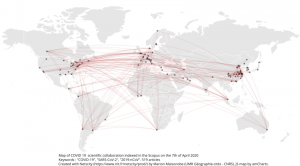The institutional competence to negotiate and conclude equitable and fair research agreements and contracts usually differs significantly between partners in high income (HIC) compared to those in low-to middle-income (LMIC) countries. Legal expertise for competent research contract negotiation is very limited in LMICs, especially in the public sector. As negotiating contracts and agreements is essential to the ‘business of science’, to becoming globally competitive, and to fair public-private sector engagements, this lack of research contracting expertise in LMICs adds substantially to their continued economic and infrastructural disadvantage
By Carel IJsselmuiden, Kirsty Kaiser
COHRED, Switzerland
Abigail Wilkinson, Farirai Mutenherwa
School of Applied Human Sciences, University of KwaZulu-Natal, South Africa
Fair Research Contracting
Key to Promoting Solidarity for Science and Development in a post-COVID-19 World
Fair research collaborations are borne from good contracts
Almost all research of any importance is done collaboratively between researchers in more than one organisation, often in more than one country. Typically, research collaborations in global health involve institutions from high income (HIC) and low-to middle-income countries (LMICs). Trust between the collaborating parties is essential for facilitating collaborations and reducing conflicts, for increasing equitability in research collaborations by encouraging fair sharing of outcomes, benefits and costs, and for building up the research institutions and systems in LMICs. This kind of trust can be firmly established through fair agreements and contracts between institutions.
Institutional competence in research contracting is as essential for institutional growth and sustainability as excellent science is for innovation and development. Having or having access to such competence should be a prerequisite for any research institution aiming to solve priority health, equity and development challenges. Many, if not all, renowned research institutions in high-income countries have their own centres of excellence in research contracting[1] and their governments provide support for those who lack such competence. [2] In contrast, institutions in many LMICs are poorly equipped and lack access to expertise in this area. As negotiating contracts and agreements is essential to the ‘business of science’, to becoming globally competitive, and to fair public-private sector engagements, this lack of research contracting expertise in LMICs adds substantially to their continued economic and infrastructural disadvantage.
The massive health, financial, institutional and political implications of bringing a COVID-19 vaccine to market is the latest example of the crucial importance of having good contracts in place for vaccine research collaborations[3] [4].
Contracting capacity in LMICs
The institutional competence to negotiate and conclude equitable and fair research agreements and contracts usually differs significantly between partners in HICs compared to those in LMICs. Legal expertise for competent research contract negotiation is very limited in LMICs[5], especially in the public sector. As a result, in spite of international commitments to engage researchers in LMICs in COVID-19 research, it is entirely predictable that the increase in social and economic capital that will result from COVID-19 vaccine research will largely accrue to HICs. In fact, LMICs have been seriously under-represented in COVID-19 vaccine research [6] [7]. A recent update from the World Economic Forum suggests that LMICs are still not being included in research opportunities [8]. This is likely due to not having research systems that can handle this kind of research. And so, a vicious circle is born in spite of best intentions.
Conversely, if ample contracting expertise had been available to LMIC institutions participating in COVID-19 clinical research, for example, then much more institutional and research system strengthening could have resulted from these collaborations, LMICs would have been better prepared to participate in global research in a next pandemic and could have faster provided the solutions appropriate to LMICs where the need for intervention is most needed.[9]
Turning the tables – enabling LMIC institutions to negotiate and conclude more equitable collaboration agreements
Fair research contracts can address systemic challenges in research capacity development in LMICs, supporting them on the road to becoming knowledge economies.[10] A more reasonable share in outcomes and benefits can be re-invested in research system development. Fair Research Contracting[11] can help institutions and countries to better understand where they need to improve to become ‘research contracting competent’. If that happens, LMICs research systems can turn the tables – instead of relying on the goodwill of HICs, LMICs can negotiate and conclude collaboration agreement in ways that best suit their development priorities.
References
[1] https://www.ucl.ac.uk/research-services/research-contracts/what-research-contract-and-why-do-i-need-one
[2] The Lambert Toolkit. https://www.gov.uk/guidance/university-and-business-collaboration-agreements-lambert-toolkit
[3] Global coalition to accelerate COVID-19 clinical research in resource-limited settings. COVID-19 Clinical Research Coalition. (2020). https://www.thelancet.com/journals/lancet/article/PIIS0140-6736(20)30798-4/fulltext
[4] Borderless collaboration is needed for COVID-19—A disease that knows no borders. Mohamed et al. (2020). https://www.cambridge.org/core/journals/infection-control-and-hospital-epidemiology/article/borderless-collaboration-is-needed-for-covid19a-disease-that-knows-no-borders/CDC82720199AC7BE4654F123DB79508E
[5] Improving international research contracting. Sack et al. (2009). https://www.ncbi.nlm.nih.gov/pmc/articles/PMC2704040/
[6] Consolidation in a crisis: Patterns of international collaboration in early COVID-19 research. Fry et al. (2020). https://journals.plos.org/plosone/article?id=10.1371/journal.pone.0236307
[7] Scientific globalism during a global crisis: research collaboration and open access publications on COVID-19. Lee & Haupt. (2020). https://link.springer.com/article/10.1007/s10734-020-00589-0
[8] COVID-19: Collaboration is the engine of global science – especially for developing countries. Kituyi. (2020). World Economic Forum. https://www.weforum.org/agenda/2020/05/global-science-collaboration-open-source-covid-19/
[9] The need for COVID-19 research in low- and middle-income countries. Gupta et al. (2020). https://link.springer.com/article/10.1186/s41256-020-00159-y
[10] Fair Research Contracting. A Self-Assessment Tool for Institutions. https://frcweb.cohred.org/wp-content/uploads/COHRED_SCNAT-FRC-Self-Assessment-Guide_V1.pdf
[11] Fair Research Contracting. http://frcweb.cohred.org (accessed 11 Dec 2020)

